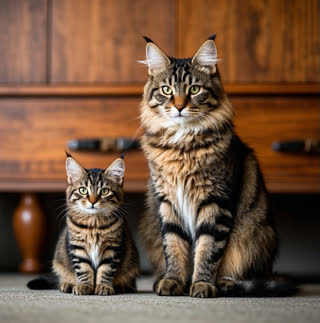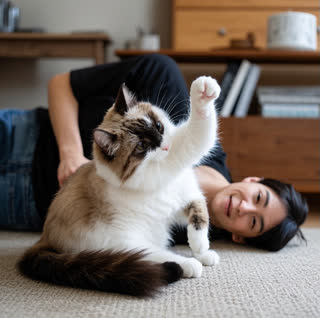If you’ve ever woken up with a cat curled up at your feet or purring beside your pillow, you’ve likely wondered, “Why do cats sleep with me?” While love and companionship are common assumptions, the answer runs deeper than affection alone. Cats are fascinating creatures with evolutionary instincts and social behaviors that drive their sleeping habits. In this article, we’ll explore 5 surprising reasons your feline friend chooses to share your bed, backed by science and insights into their natural inclinations.
1. Safety and Security: The Primordial Need to Survive
One of the most compelling reasons cats sleep with humans is rooted in their ancient survival instincts. In the wild, cats are both predators and prey. Their sleep patterns reflect this duality: they nap in short bursts (15–30 minutes) to conserve energy for hunting while remaining alert to threats. By sleeping beside you, they tap into your perceived role as a protector. Your presence provides a sense of safety, especially during their vulnerable deep sleep phases.
Domestic cats retain this instinct, even if they’ve never stepped outdoors. Your bed offers a high vantage point to monitor the room, mimicking the elevated spots wild cats favor. Plus, your rhythmic breathing and body heat signal stability, reducing their stress levels. So, when your cat sleeps near you, they’re not just cuddling—they’re subconsciously safeguarding themselves.
2. Temperature Regulation: The Cozy Comfort of Your Body Heat
Cats are notorious for seeking warm spots, and your bed is a prime target. Humans emit steady body heat, creating an ideal environment for cats to maintain their optimal body temperature (around 101°F). This is especially true during colder months or for older cats, whose metabolism slows.
Research shows cats prefer sleeping in temperatures between 86–97°F. Your bed, often layered with blankets, traps heat effectively. During their light “cat naps,” they might even adjust their position to maximize warmth. So, if your cat kneads your blankets or curls into a tight ball, they’re optimizing their comfort zone.
3. Social Bonding: The Language of Trust and Affection
While cats are often seen as independent, they form strong social bonds with their human families. Sleeping together is a sign of trust. Cats who choose to share your bed are signaling that they feel secure and emotionally connected to you. This behavior is especially common in multi-cat households, where cats may also sleep together to reinforce group cohesion.
Interestingly, cats may mirror your sleep schedule. If you’re a night owl, your cat might adjust their activity to align with yours, even if it means napping during the day. This adaptability strengthens the human-cat bond, creating a shared rhythm that fosters companionship.
4. Hunting Instincts: Stalking Prey… in Their Dreams
Cats spend about 25% of their sleep in REM (Rapid Eye Movement) cycles, similar to humans. During these phases, their brains process memories and simulate hunting scenarios. You might notice twitching paws, whisker movements, or even quiet meows—signs they’re dreaming about chasing prey.
Sleeping near you allows them to “rehearse” these instincts in a safe space. Your presence reassures them that they can fully engage in these dream sequences without danger. Plus, if they suddenly wake from a vivid dream, your proximity offers immediate comfort.
5. Territorial Marking: Claiming You as “Their Human”
Cats have scent glands in their paws and faces, which they use to mark territory. When your cat sleeps on your bed, they’re leaving subtle pheromones behind, essentially claiming you as part of their social group. This behavior is more common in single-cat households, where the cat may feel a stronger need to assert their bond with you.
Additionally, your scent becomes familiar and comforting to them. Over time, your bed becomes a shared space that smells like both of you, reinforcing their sense of belonging.
When to Worry: Understanding Abnormal Sleep Patterns
While cats typically sleep 12–16 hours daily, changes in their routine could signal health issues. If your cat suddenly sleeps more or less than usual, seems lethargic, or has trouble waking up, consult a vet. Conditions like obesity, arthritis, or thyroid problems can disrupt sleep. Kittens and senior cats naturally sleep more, but sudden shifts warrant attention.
How to Encourage Healthy Sleep Habits
Provide cozy alternatives: Offer cat beds in warm, quiet areas to give your cat options.
Stick to a routine: Feed and play at consistent times to help regulate their sleep-wake cycles.
Create a safe environment: Ensure their sleeping spaces are free from drafts and noise.
Avoid disrupting deep sleep: Let them finish their REM cycles to support their cognitive health.
Conclusion: Decoding Your Cat’s Sleeping Choices
Understanding why cats sleep with you adds depth to your relationship. From survival instincts to emotional bonds, their behavior is a mix of biology and affection. By respecting their need for warmth, safety, and companionship, you’ll strengthen the trust they’ve placed in you. So, the next time your cat claims your pillow, remember—it’s not just love; it’s a fascinating blend of nature and nurture.
Final Tip: If you’re struggling to sleep with a cat who’s too active at night, gradually adjust their schedule with playtime before bed. You’ll both enjoy better rest while keeping the cuddles intact!
By addressing these reasons, you’ll not only satisfy your curiosity but also become a more informed and compassionate cat parent. After all, a well-rested cat is a happy cat—and a happy cat makes for a happier home.










